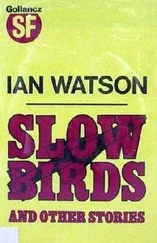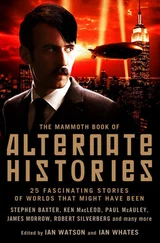Peterkin was handsome where his friend was pretty. Slim, blond, steely-eyed, and with noble features. Yet all for what? Here in the secret police building he mostly met frumps or frigid functionaries. The foxy females were bait for foreign diplomats and businessmen. Out on the streets, whores were garishly painted in a do-it-yourself style: Slash lips, cheeks rouged like stop-lights, bruised eyes. Under the evening street lamps those ladies of the night looked so lurid to Peterkin.
Excellent food a-plenty was on offer to the secret servants of the State such as he. Goose with apples, breaded mutton chops, shashlik on skewers, steamed sturgeon. Yet whereabouts in his life were the soubrettes and odalisques and gorgeous inamoratas? Without whom, how could he really sate himself?
"So how are the, um, projections?" Goldman asked idly.
"Usual thing, old son. I'm busy using Cassini's method. Distances along the central meridian are true to scale. But all other meridian lines stretch the distances. That makes Cassini's projection fine for big countries that spread from north to south. Of course ours sprawls from east to west. Ha! Across a few thousand kilometres that's quite enough distortion for an enemy missile to miss a silo by kilometres."
"Those geese and turkeys gave their wings to shelter us! Gratifying to know that I'm carving patriotic pens."
"I wonder," Peterkin murmured, "whether amongst our enemies I have some exact counterpart whose job is to deduce which projections I'm using to distort different areas of land…"
Goldman leaned closer. "I heard a rumour. My boss Andrey was talking to Antipin. Andrey was projecting the future . Seems that things are going to change. Seems, for the sake of openness, that we'll be publishing true maps sooner or later."
Peterkin chuckled. This outlook seemed as absurd as that he himself might ever become a member of the Academy of Arts.
Yet that very same evening Peterkin saw the woman of his desires.
He had stepped out along Krasny Avenue and turned down Zimoy Prospekt to enter the park. It was only early September, so the ice-skating rink was still a lake dotted with ducks: fat quacking boats laden with potential pens, pens, pens. The air was warm, and a lone kiosk sold chocolate ice cream to strollers; one of whom was her.
She was small and pert, with eyes that were brimming china inkwells, irises of darkest brown. Her curly, coal-black hair-not unlike friend Goldman's, in fact-formed a corona of sheer, glossy darkness, a photographic negative of the sun in eclipse; the sun itself being her round, tanned, softly-contoured face. From the moment Peterkin saw her, that woman suggested a sensuality bottled up and distilled within her-the possibility of love, lust, inspiration, nourishment. She was a liqueur of a lady. She was caviar, licking a chocolate cornet.
Her clothes were routine: cheaply styled bootees and an open raincoat revealing a blotchy floral dress. Yet Peterkin felt such a suction towards her, such a powerful current flowing in her direction.
She glanced at him and shrugged with what seemed a mixture of resignation and bitter amusement. So he followed her out of the park, across the Prospekt, into a maze of minor streets which became increasingly unfamiliar.
Some empty stalls stood deserted in a square which must serve as a market place, so he realized that he was beginning to tread "dead ground," that unacknowledged portion of the city which did not figure on any plans. If inspectors approached by car they would be hard put to find these selfsame streets. One-way and no-entry signs would redirect them away. Such was the essence of this district; impenetrability was the key that locked it up safely out of sight.
Of course, if those same inspectors came on foot with illicit purposes in mind-hoping to buy a kilo of bananas, a rare spare part for a washing machine, or a foreign pornography magazine-they could be in luck. Subsequently they wouldn't be able to report where they had been with any clarity.
The moan of a saxophone assailed Peterkin's ears; a jazz club was nearby. Rowdy laughter issued from a restaurant where the drapes were drawn; he judged that a heavy drinking bout was in progress.
A sign announced Polnoch Place . He had never heard of it. How the sky had darkened, as if in passing from street to street he had been forging hour by hour deeper towards midnight. At last the woman halted under a bright street lamp, her ice cream quite consumed, and waited for him, so unlike the ill-painted floozies of more public thoroughfares.
He cleared his throat. "I must apologize for following you in this fashion, but, well-" Should he mention voluptuous canvases? He flourished his sketchbook lamely.
"What else could you do?" she asked. "You're attracted to me magnetically. Our auras resonate. I was aware of it."
"Our auras-?"
"Our vibrations." She stated this as a fact.
"Are you psychic? Are you a medium?"
"A medium? Oh yes, you might say so. Definitely! A conduit, a channel, a guide. How else could you have strayed so far into this territory except in my footsteps?"
Peterkin glanced around him at strange facades.
"I've heard it said… Are there really two countries side by side-one where the secret police hold sway, and a whole other land which is simply secret ? Not just a few little dead zones-but whole swathes of hidden terrain projecting from those zones?"
"Why, of course! When human beings yearn long enough to be some place else, then that somewhere can come into being. Imagine an hourglass; that's the sort of shape the world has. People can drift through like grains of sand-though only so far. There's a kind of population pressure that rebuffs intruders. For the second world gives rise to its own geography, but also to its own inhabitants."
"Has anyone mapped this other terrain?"
"Is that what you do, draw maps?" Her hair, under the street lamp! Her face, like a lamp itself unto him!
His job was a state secret. Yet this woman couldn't possibly be an "eye" of the police, trying to trap him.
"Oh yes, I draw maps," he told her.
"Ah, that makes it more difficult for you to come here."
"Of course not. Don't you realize? Our maps are all lies! Deliberate lies, distortions. In the department of cartography our main brief is to warp the true shape of our country in all sorts of subtle ways."
"Ah?" She sounded unsurprised. "Where I come from, artists map the country with kaleidoscopes of colour. Musicians map it in a symphony. Poets, in a sonnet."
It came to Peterkin that in this other land he could at last be the painter of his desires. He had never believed in psychic phenomena or in a spirit world (unless, perhaps, it was the world of ninety-proof spirit). Yet this circumstance was different. The woman spoke of a material other world-extending far beyond the dead ground of the city. Peterkin knew that he must possess this woman as the key to all his hopes, the portal to a different existence.
"So do you despise your work?" she asked him.
"Yes! Yes!"
She smiled invitingly-and wryly, as though he had already disappointed her.
"My name's Masha."
Her room was richly furnished with rugs from Central Asia, silverware, onyx statuettes, ivory carvings. Was she some black marketeer in art treasures or the mistress of one? Had he stumbled upon a cache hidden since the Revolution? Curtains were woven through with threads of gold. Matching brocade cloaked the bed in a filigree till she drew back the cover, disclosing silk sheets as blue as the clearest summer sky. Her cheap dress, which she shed without further ado, uncovered sleek creamy satin camiknickers… which she also peeled off carelessly.
"Take fright and run away, Peterkin," she teased. "Take fright now!"
Читать дальше












